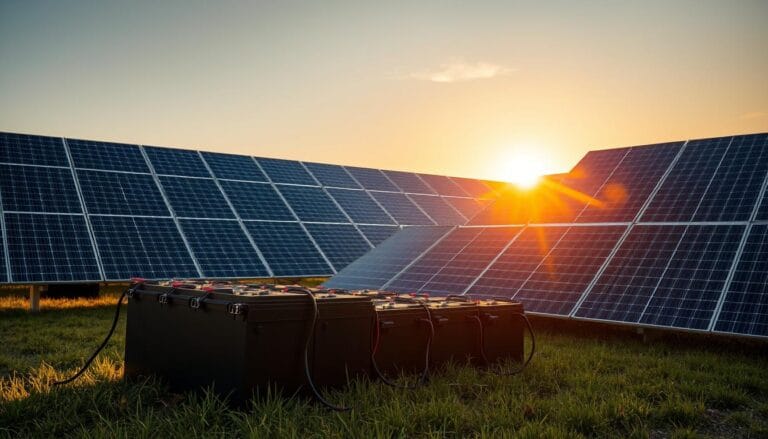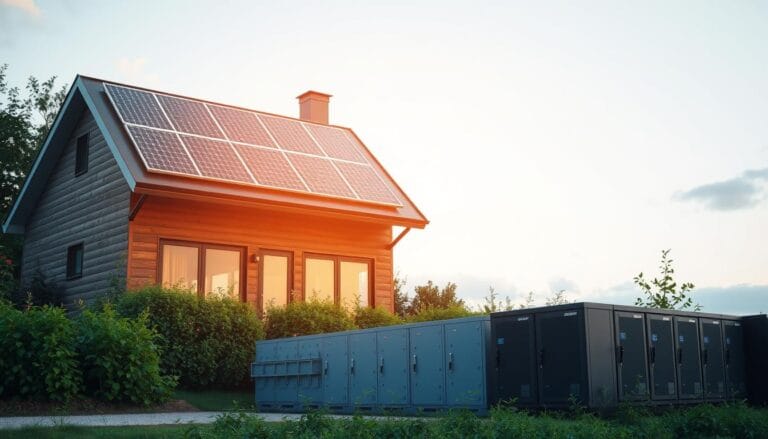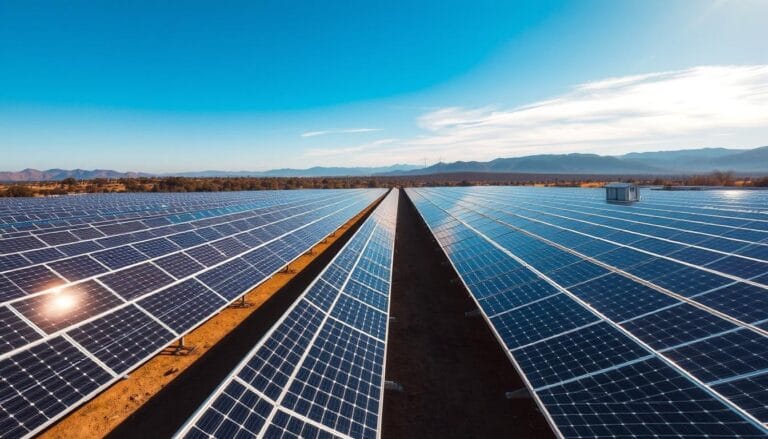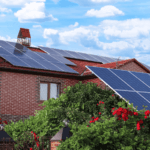In the fast-growing solar energy market, 12V solar charge controllers are key. They help manage power from solar panels. The global market is set to hit $2.2 billion by 2027. Morningstar’s 12 volt charge controller solar options include top-notch MPPT and PWM controllers. They are built for tough off-grid environments.
12V solar charge controllers are vital for small-scale solar systems. They ensure batteries charge well and protect against damage. In developing countries, over 50% of off-grid systems use these controllers.
They work efficiently, with 75% to 95% performance. 12V solar charge controllers can handle up to 30 amps. This makes them perfect for many uses, like remote cabins, RVs, and even solar art.
Key Takeaways
- 12V solar charge controllers are essential for managing power in small-scale off-grid solar systems
- The global solar charge controller market is expected to reach $2.2 billion by 2027
- Morningstar offers a range of high-performance 12V MPPT and PWM controllers for demanding applications
- 12V solar charge controllers ensure efficient battery charging and protect electrical components
- These controllers are suitable for various applications, from residential to commercial and mobile solar systems
Understanding Solar Charge Controllers
In the world of solar energy, solar charge controllers are key. They make sure off-grid solar systems work well and last long. These devices control the flow of energy from solar panels to batteries, stopping overcharging and managing energy well. As we all look for green energy, knowing about solar charge controllers is more important than ever.
What is a Solar Charge Controller?
A solar charge controller is a must-have for off-grid solar systems. It connects solar panels to batteries, controlling the energy flow. This prevents overcharging and keeps batteries healthy. Most “12 volt” solar panels give out 16 to 20 volts, so control is needed to keep batteries working right.
There are different types of solar charge controllers, each with its own benefits. The main types are:
- Simple controllers
- 3-stage and/or PWM (Pulse Width Modulation) controllers
- MPPT (Maximum Power Point Tracking) controllers
3-stage and/or PWM controllers are the most common and reliable. They use Pulse Width Modulation to charge batteries efficiently. This keeps batteries in the best condition.
The Role of Solar Charge Controllers in Off-Grid Systems
In off-grid solar systems, solar charge controllers are crucial. They control the energy flow from solar panels to batteries. This protects batteries from overcharging, which can harm them. It also makes sure batteries get the most energy possible, no matter the weather.
One big advantage of solar charge controllers is they help batteries last longer. By stopping overcharging, these devices keep batteries healthy. This means batteries don’t need to be replaced as often, saving money over time. This is especially important in off-grid systems, where batteries need to last a long time.
“Solar charge controllers are the unsung heroes of off-grid solar systems, working tirelessly to ensure that every drop of energy is efficiently harnessed and stored for future use.”
When picking a solar charge controller, think about your system’s voltage, solar panel output, and battery type. The right controller is key for good performance and reliability. With the right controller, an off-grid solar system can give clean energy for years, helping people and communities use less fossil fuels.
Types of 12V Solar Charge Controllers
When setting up an off-grid power solution or renewable energy system, knowing the different 12V solar charge controllers is key. There are two main types: PWM (Pulse Width Modulation) and MPPT (Maximum Power Point Tracking). Each has its own benefits and uses.
PWM (Pulse Width Modulation) Controllers
PWM charge controllers are great for smaller systems. You might find them in vans, RVs, and tiny homes. They work by sending short pulses to control the charging process. PWM controllers are best for systems where the solar panel and battery voltages are close, especially in warmer places.
Some key features of PWM charge controllers include:
- They are budget-friendly, costing between $20 and $60.
- Their efficiency is around 75-80%.
- They have a simpler design, which can make them last longer.
- They’re perfect for small systems where efficiency isn’t as critical.
A 10A PWM controller can handle up to 160W for 12V batteries. A 20A PWM controller can manage up to 320W for 12V batteries or 640W for 24V batteries.
MPPT (Maximum Power Point Tracking) Controllers
MPPT charge controllers are more advanced and efficient than PWM controllers. They constantly check the solar array’s output and adjust to get the most power. MPPT controllers are best for bigger systems, like cabins and homes, where the solar array voltage is higher than the battery voltage.
Key advantages of MPPT charge controllers include:
- They have higher efficiency ratings, around 92-95%.
- They can get up to 5-30% more energy from solar arrays than PWM controllers.
- They work well with many solar modules and setups.
- They can handle oversized arrays that PWM controllers can’t.
Morningstar’s MPPT charge controllers, with their TrakStar technology, can charge up to 10-15% more than standard PWM regulators. These MPPT charge controllers are great for 12V battery systems needing extra power and support for large arrays in off-grid setups.
Comparing PWM and MPPT Controllers for 12V Systems
| Feature | PWM Controllers | MPPT Controllers |
|---|---|---|
| Cost | $20 – $60 | $100 – $729 |
| Efficiency | 75-80% | 92-95% |
| Ideal System Size | Small-scale (vans, RVs, tiny homes) | Larger systems (cabins, homes) |
| Climate Preference | Warmer climates | Colder climates |
| Lifespan | Around 15 years | Around 15 years |
When picking a 12V solar charge controller, think about your system’s size, climate, budget, and how efficient you need it to be. Choosing the wrong controller can lead to losing up to 50% of the power from solar panels. So, it’s important to pick the right one for your needs.
Key Features of 12V Solar Charge Controllers
Choosing the right 12V solar charge controller is key for your photovoltaic system components. These controllers are vital for managing energy sustainably, especially in off-grid systems.
Voltage and Current Regulation
A 12V solar charge controller manages the voltage and current from solar panels to batteries. It stops overcharging, which harms battery life. Controllers with PWM or MPPT tech adjust voltage and current for better charging.
Battery Overcharge Protection
Overcharging is a big problem in off-grid solar systems. A 12V solar charge controller with overcharge protection stops this. It disconnects panels from batteries when fully charged, protecting batteries.
A well-designed 12V solar charge controller optimizes charging and protects batteries from overcharging and deep discharge.
Low Voltage Disconnect (LVD) Function
A 12V solar charge controller also has a Low Voltage Disconnect (LVD) function. It kicks in when battery voltage gets too low, disconnecting the load. This prevents over-discharge and damage, crucial in off-grid systems.
High-quality 12V solar charge controllers also have:
- 3 or 4 stage charging algorithms for optimal battery charging
- Equalization mode to maintain battery balance and health
- Remote monitoring and control capabilities
- Programmable settings for customized charging profiles
Choosing a 12V solar charge controller with these features ensures your system works efficiently. It also extends battery life. Investing in a quality charge controller is essential for a reliable off-grid solar power solution.
Sizing a 12V Solar Charge Controller for Your System
When setting up a solar panel system, it’s key to pick the right 12V solar charge controller. This ensures your system works well and lasts long. Charge controllers are important for managing energy and keeping your equipment safe from damage. If the controller is too small, you could lose half of your solar power.
To find the right size for your 12V solar charge controller, think about a few things:
- Total solar array wattage
- Battery bank voltage and capacity
- Expected load consumption
The charge controller’s current rating needs to be higher than the solar array’s max output. PWM controllers are good for small systems like vans and RVs. They work best in sunny weather. MPPT controllers, however, are more efficient and better for bigger systems like cabins and homes, especially in cold weather.
Choosing the right charge controller size can save up to 50% of solar power, making it a key part of solar installations.
When picking a 12V solar charge controller, look at these specs:
| Specification | Description |
|---|---|
| Nominal System Voltage | Commonly 12, 24, or 48 volts |
| Rated Battery Current | Ranges from 1 to 60 amps |
| Maximum Solar Input | Higher for MPPT controllers compared to PWM |
| Terminal Size | Ensures compatibility with wiring gauge |
| Compatible Battery Types | Lead-acid, lithium-ion, or other chemistries |
By choosing the right 12V solar charge controller and type for your system, you can make your solar power work better. This protects your investment in green technology.
12 volt charge controller solar: Choosing the Right Option
When setting up a 12V solar power system, picking the right solar charge controller is key. It controls the electricity flow from solar panels to batteries. This ensures they charge well and don’t get damaged from overcharging.
Considering Your System Requirements
Before picking a 12V solar charge controller, think about your system’s needs. Look at your solar array size, battery type and capacity, and load demands. A charge controller that’s too small can waste up to 50% of solar power. On the other hand, a too-large controller can be pricey and inefficient.
Evaluating Product Specifications and Performance
When looking at 12V solar charge controllers, focus on their specs and how well they perform. There are two main types: Pulse Width Modulation (PWM) and Maximum Power Point Tracking (MPPT). PWM is cheaper and good for small systems. MPPT is more efficient and better for bigger systems, with efficiency over 90%.
Other specs to check include:
- Input voltage range
- Charging current rating
- Additional features (e.g., monitoring, data logging)
| Charge Controller Type | Ideal System Size | Efficiency | Price |
|---|---|---|---|
| PWM | Small to medium | 75-80% | Lower |
| MPPT | Medium to large | 90-98% | Higher |
Recommended PWM charge controller: Zamp Solar – 30A 5-Stage PWM Charge Controller
Recommended MPPT charge controllers: Outback Power – FlexMax FM60 MPPT Charge Controller and Victron – SmartSolar 100/50 Bluetooth MPPT Charge Controller
Compatibility with Solar Panels and Batteries
Make sure the 12V solar charge controller works with your solar panels and batteries. PWM controllers need the solar panel’s voltage to match the battery’s. MPPT controllers can handle higher voltage solar arrays than the battery voltage.
Also, think about the system voltage (12V, 24V, or 48V) and the solar panel array’s maximum current. The controller should handle more current than the solar panels to work well and avoid overloading.
By carefully looking at your system needs, comparing products, and checking compatibility, you can pick the best 12V solar charge controller. This will make your off-grid solar power system efficient, extend battery life, and improve overall performance.
Installation and Setup of 12V Solar Charge Controllers
Setting up a 12V solar charge controller is key to your off-grid solar system‘s success. These controllers manage electricity flow from the photovoltaic system to batteries. This prevents overcharging and extends battery life. With the right setup, your renewable energy control system will use solar power efficiently.
Wiring Diagram and Connections
Start by studying the manufacturer’s wiring diagram. This ensures correct connections between solar panels, batteries, and loads. Most controllers have three DC-cables for positive and negative connections. When using two controllers with one battery, make sure total current doesn’t exceed the battery’s limit.
For your 12V solar charge controller installation, remember these tips:
- Use the right wire gauges to handle current and reduce voltage drop
- Check polarity when connecting panels, batteries, and loads
- Install DC breakers or fuses for protection against short-circuits and overloads
- Keep cable length between battery and controller short for best performance
Programming and Configuration Settings
After wiring, set up your 12V solar charge controller’s settings. Many controllers let you program settings like battery type and charging voltages. These should match your battery and renewable energy system’s needs.
When setting up your solar charge controller, consider these factors:
- Battery type and its charging needs
- Low voltage disconnect (LVD) and reconnect voltages for battery protection
- Load control settings, like timers or light-sensitive switches
- Temperature compensation for adjusting charging voltages
Proper configuration of your 12V solar charge controller ensures your solar power management system works well. Always check the manufacturer’s manual for specific guidance.
Proper installation and configuration of your 12V solar charge controller is key to ensuring the long-term reliability and efficiency of your off-grid solar power system.
Monitoring and Maintenance of 12V Solar Charge Controllers
Keeping your 12V solar charge controller in top shape is key. Regular checks help it work better and last longer. This is especially true for off-grid solar systems.
Many controllers have LED lights or digital screens. These show you how things are going with your solar setup. Some even let you check in from anywhere using Wi-Fi or Bluetooth.
It’s important to look over your controller now and then. Look for any signs of wear or damage. Loose connections or corrosion can hurt your system’s performance. Keeping it clean and cool helps it last longer.
Studies show that 78% of users who check and care for their controllers see better performance. The Solar Energy Industries Association found that good maintenance can boost efficiency by 15%.
| Maintenance Task | Frequency | Benefits |
|---|---|---|
| Visual inspection | Monthly | Identify potential issues early |
| Clean controller and connections | Quarterly | Prevent corrosion and overheating |
| Check battery voltage and current | Monthly | Ensure optimal charging and prevent overcharging |
| Update firmware/settings | As needed | Optimize performance and compatibility |
By taking care of your 12V solar charge controller, you make sure your system works its best. This means more power from the sun and a better return on your investment.
“Proper maintenance of your solar charge controller is like regular oil changes for your car – it keeps everything running smoothly and extends the life of your system.” – John Stevens, Solar Energy Expert
In short, looking after your 12V solar charge controller is vital. It keeps your off-grid solar system running well. With the right care, you can enjoy clean energy for a long time.
Real-World Applications of 12V Solar Charge Controllers
12V solar charge controllers are key in off-grid settings. They manage power and protect batteries. These devices are used in many places, like homes, vehicles, and monitoring systems. Let’s look at some common uses of 12V solar charge controllers.
Off-Grid Homes and Cabins
For those living off the grid, 12V solar charge controllers are vital. They control battery charging in off-grid homes and cabins. This prevents overcharging and ensures batteries last longer.
By managing solar panel energy, these controllers provide a steady power supply. This is crucial for lighting and appliances in off-grid homes.
RVs, Caravans, and Boats
Recreational vehicles, caravans, and boats use solar power on the move. An RV solar charge controller is essential for charging house batteries from solar panels. A marine solar charge controller is built to handle the tough marine environment.
These controllers improve charging efficiency and battery life. They ensure a reliable power source for off-grid travel.
Remote Monitoring and Telecommunication Systems
In areas without reliable grid power, 12V solar charge controllers power monitoring and telecommunication systems. They provide a stable power supply for weather stations and communication devices. A remote monitoring charge controller has features like data logging and remote access.
This makes managing off-grid power systems easier from a distance.
| Application | Key Benefits |
|---|---|
| Off-Grid Homes and Cabins | Energy independence, reliable power supply, sustainable living |
| RVs, Caravans, and Boats | Portable power solution, extended off-grid capabilities, battery protection |
| Remote Monitoring and Telecommunication Systems | Stable power for remote equipment, advanced monitoring features, autonomous operation |
12V solar charge controllers are vital in many areas. They power off-grid homes, support off-grid adventures, and aid remote monitoring systems. These controllers ensure efficient energy use and battery protection, making solar power a sustainable choice for various needs.
Troubleshooting Common Issues with 12V Solar Charge Controllers
Working with 12V solar power systems means knowing about common problems with solar charge controllers. These devices manage the electricity flow from solar panels to batteries. They ensure batteries charge well and stay safe. Knowing how to fix common issues helps keep your system running smoothly and lasts longer.
Battery Overcharging or Undercharging
One big problem is when batteries get overcharged or undercharged. Overcharging happens when too much electricity goes into the battery, raising its voltage too high. This can shorten the battery’s life and even damage it. Undercharging means the battery doesn’t get enough electricity, making it less effective.
To fix these issues, follow these steps:
- Use a multimeter to check the battery voltage. It should be between 12 and 13 volts. Adjust the controller if the voltage is off.
- Make sure the solar panels are working right. Poor orientation, dirt, or pollution can lower their output.
- Look at the wiring connections. Bad connections can stop the battery from charging properly.
Inconsistent Power Output
When your 12V solar charge controller’s power output is not steady, it’s a big problem. This can show up as changing voltage or charging that stops and starts. Several things can cause this, like:
- Bad or damaged solar panels that don’t work well.
- Wiring that’s loose or corroded, blocking electricity flow.
- Broken parts in the charge controller, like MOSFETs or capacitors.
- Components that don’t match or work together well.
To solve this, check all parts and wiring. Fix any loose or damaged connections. If it still doesn’t work, get help from the maker or a solar expert.
Controller Overheating or Failure
Solar charge controllers handle the power from solar panels and control charging. But sometimes, they can get too hot or fail. Overheating happens when there’s too much current or not enough air around the controller, which can hurt its performance.
To fix overheating or failure:
| Cause | Solution |
|---|---|
| Too much current from solar panels | Make sure the solar panel current doesn’t go over the controller’s limit |
| Not enough air around the controller | Put the controller in a cool, dry place with good air flow |
| Short circuits in the load output | Check for loose connections, damaged wires, bad fuses, or tripped breakers |
| Controller not working right | Replace it with a new one from a trusted maker |
By quickly and correctly fixing these common problems, your 12V solar charge controllers will work their best. This keeps your solar battery chargers running well and keeps your whole solar system healthy.
Advances in 12V Solar Charge Controller Technology
As off-grid energy systems and renewable power solutions grow in popularity, 12V solar charge controller tech has changed a lot. Now, MPPT controllers are more efficient and work with many solar arrays. They are key for off-grid setups.
Smart algorithms are now part of these controllers. They help charge batteries better and manage loads. This means your batteries last longer and work better.
“The latest generation of MPPT controllers not only maximizes the power output from your solar panels but also provides a level of system monitoring and control that was previously unavailable in off-grid setups.”
Now, you can monitor and control your system from anywhere. Mobile apps and web interfaces make it easy. This means you can fix issues quickly and keep your system running smoothly.
| Specification | Value |
|---|---|
| Model | HCC30DCSR |
| Battery Voltage Compatibility | 12V / 24V |
| Max. Solar Input Power | 450W / 900W |
| Max. Solar Input Voltage | 60 Voc |
| Max. Charging Current (External) | 30 A |
| Tracking Efficiency | 99% |
| Peak Conversion Efficiency | 98% |
New designs keep the controllers cool and safe in tough places. This makes them reliable for off-grid energy systems and renewable power solutions everywhere.
- Enhanced efficiency and compatibility
- Smart algorithms for optimal battery charging
- Remote monitoring and control capabilities
- Improved heat dissipation and environmental protection
As tech keeps getting better, we’ll see even more great things in 12V solar charge controllers. They will play a big part in our future energy needs.
Conclusion
12 volt charge controller solar devices are key for off-grid energy solutions. They make sure batteries charge safely and efficiently from solar panels. These controllers manage the voltage and current, stopping overcharging and making charging better.
Solar panels usually have a 17V rating for 12V batteries. Charge controllers adjust this to fit the battery’s needs, which change based on charge level and temperature.
Choosing the right solar charge controller is important for your system. Look at the controller type (PWM or MPPT), system size, and battery details. MPPT controllers are more efficient but cost more. PWM controllers are cheaper and good for smaller systems like RVs.
The controller’s amp rating must match the PV array’s size. This ensures it can handle the system’s power needs.
Installing, setting up, and maintaining 12 volt charge controllers is crucial. They help your off-grid solar system work well for a long time. As technology gets better, these controllers get more efficient and have cool features.
Knowing how solar charge controllers work helps you make smart choices for your renewable energy setup. This leads to a greener future for all of us.

























